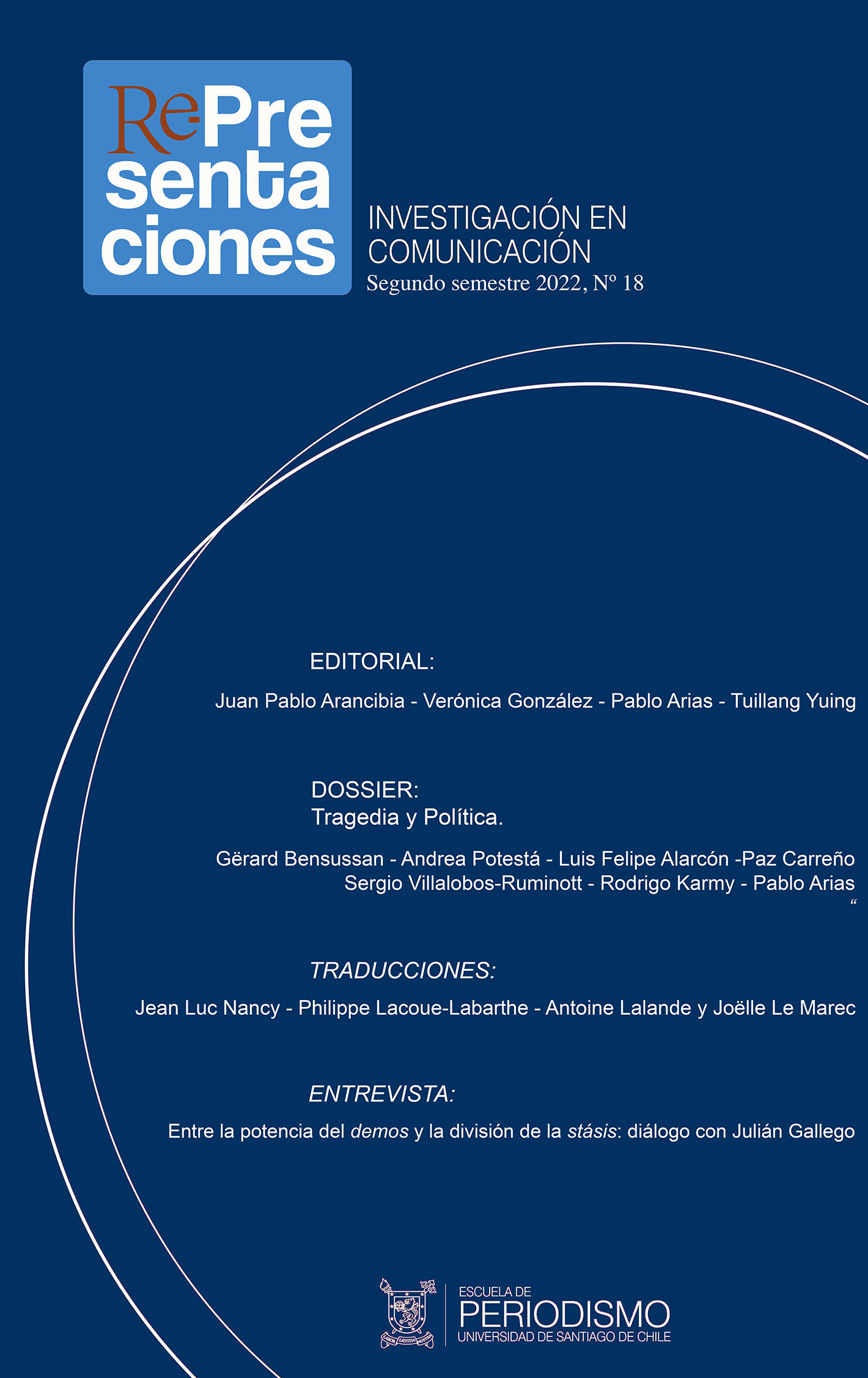Averroe’s laugh : The funny problem in Averroist gnoseology
DOI:
https://doi.org/10.35588/rp.v0i18.5934Keywords:
averroism, intellect, tragedy, comedyAbstract
This essay argues that the averroist gnoseology developed in the Great Commentary on Aristotle´s De Anima by the cordovan philosopher (Averroes) has a comic nature. In this sense, this gnoseology can work against the grain of the tragedy and the way in which it, as has been worked by Phillipe Lacoue-Labarthe, turns human being into a subject, giving him a “being of his own”. The doctrine of the separate, unique and eternal Intellect, far from constituing a conception opposed to tragedy,would become its interruption: a moment of suspensión of the becoming subject of man that is not resolved in the configuration of the subject and the attribution of his “proper being” but in the gesture that exposes the mask as a relationship of use, rather tan the substancialization of the person and property. In this light the averroist gnoseology would be “comic” rather tan “tragic” since it interrupts the operation of appropiation.
Downloads
References
Agamben. G. (2022). La locura de Hölderlin. Buenos Aires: Ed. Adriana Hidalgo.
_____ (2010). Comedia. En: Giorgio Agamben. Categorie Italiane. Studi di poética e di letteratura. Roma: Ed. Laterza.
Averroes. (2005). Sobre el intelecto. Madrid: Ed. Trotta.
Brenet, J. B. (2015). Averroès. L ´inquiètant. París : Ed. Belles Letres.
_____ (2017). Je fantasme. Averroès et l´espace potentiel. París : Ed. Verdier.
_____ (2020). L´immagine abolita, desiderata. En: Jean Baptiste Brenet, Giorgio Agamben. Intelletto d´amore. Ed. Quodlibet, pp. 47-76.
_____ (2013) Acquisition de la pensé et acquisition de l´acte chez Averroès. Una lectura croisée du Gran Commentaire au De Anima et du Kitab al Kasf ´an manahig al –adilla. En: Luis Xavier López-Farjeat; Jörg Alejandro Tellkamp (eds) Philosophical Psychology in arabic Thought and the latin aristotelianism of the 13rd century. Paris: Ed. Vrin, pp. 111-140.
Coccia. E. (2005). La trasparenza delle immagini. Averroè e l´averroismo. Ed. Bruno Mondadori, 2005.
De Libera. A. (2005). Pensar la Edad Media. Barcelona: Ed. Anthropos.
Gilson. E. (2017). La Filosofía en la Edad Media. Desde los orígenes patrísticos hasta el fin del siglo XIV. Madrid: Ed. Gredos.
Karmy. R. (2022). El monstruo Averroes. La invención del “hombre” y el problema de la propiedad. En: Rodrigo Karmy, Miguel Carmona, Benjamin Figueroa (eds). Averroes Intempestivo. Ensayos sobre intelecto, imaginario y potencia. Santiago de Chile: Ed. Doble a.
Koyré. A. (2012). Estudios de Historia del pensamiento científico. México: Ed. Siglo XXI.
Lacoue-Labarthe. P. (2010). Historia y mímesis. En: Phillipe Lacoue-Labarthe. La imitación de los modernos (tipografías 2). Buenos Aires: Ed La Cebra, pp. 97-126.
Le Goff. J. (1996). Los intelectuales de la Edad Media. Barcelona: Ed. Gedisa, Barcelona.
Ogden. S. (2022). Averroes on intellect. Oxford: Oxford University Press.
Said. E. (2003). Orientalism. New York: Ed. Penguin.
Downloads
Submitted
2023-01-07Published
Issue
Section
License
Copyright (c) 2023 Rodrigo Karmy

This work is licensed under a Creative Commons Attribution 4.0 International License.









